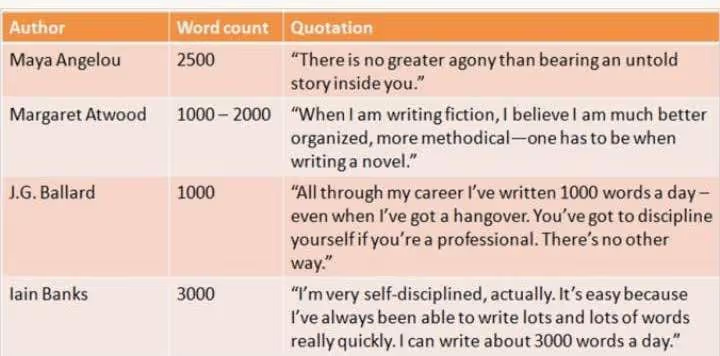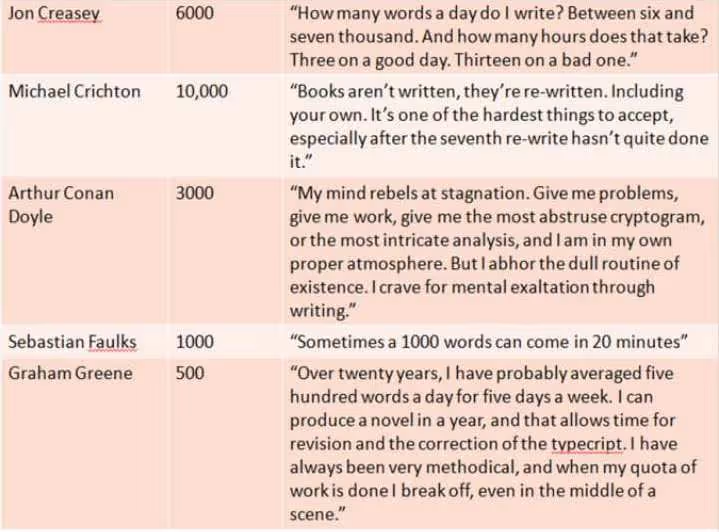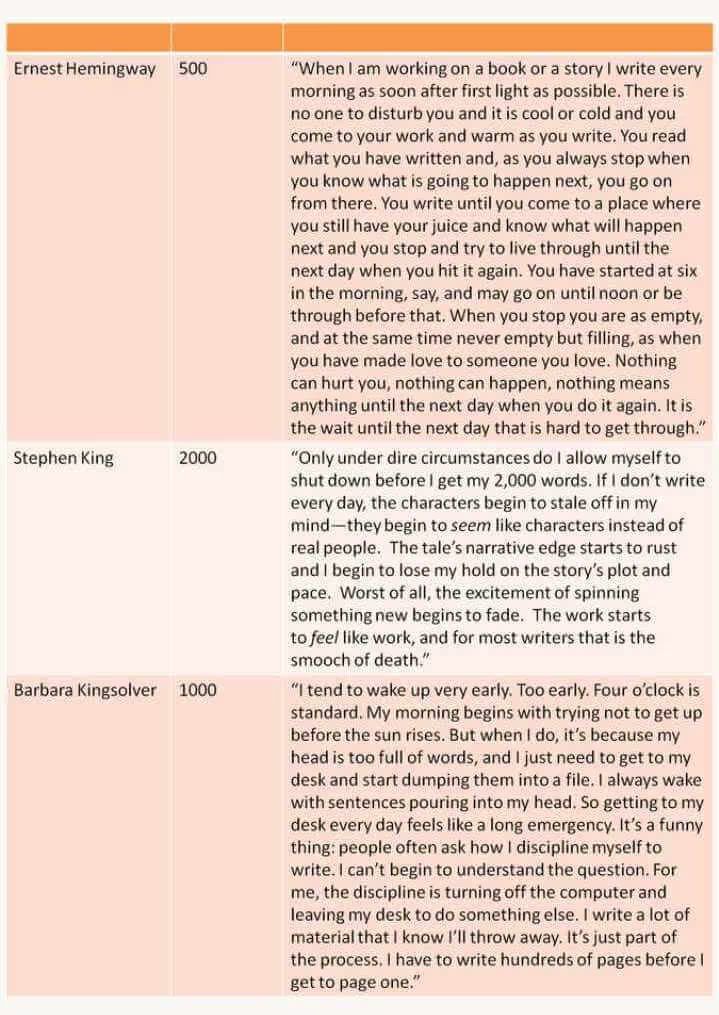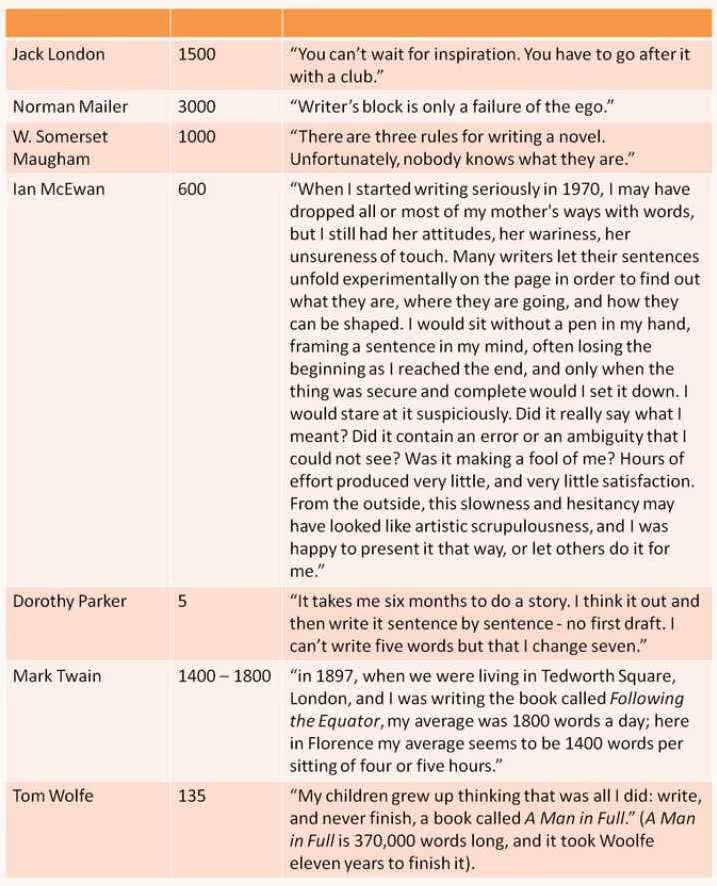When writers write, we often get fixated on productivity and our daily word counts. And it’s normal! It’s work where quality and output are often intangible, and there are so many other factors at play that some kind of objective measure of how we’re doing is a natural thing to cling to. We feel if we’ve hit a certain number of words a day, we might get away with calling ourselves writers for the day.
Of course, at The Novelry, we know that there are so many other ways to be productive that have nothing to do with how many words you’ve actually written. In fact, some days (or even weeks!) may well be dedicated to reducing your word count once you’re at the editing stage. Our founder and Booker Prize-winning author Louise Dean writes hundreds of thousands of words and then reduces them down to 80k or so for a novel, which she says is a fool’s economy (‘but then,’ she adds, ‘as Dolly Parton said, “it takes a lot of money to look this cheap!”’).
And while writing for four or five hours might work for some people, we prefer one golden hour a day. Just get your hour in, and don’t fret too much about exactly how many words you’ve written. Instead, focus on creating a daily writing routine that you can (and want to!) stick to. Make your writing habitat beautiful and peaceful so that every writing session is a joy. And if you’re ever facing writer’s block, remember that not every word you write has to be award-worthy! You could write 1,400 words that all get deleted next week, but at least you’ve been writing.
.avif)
We wouldn’t want you to think of your daily word count as the measure of your worth or success, and we certainly don’t advocate for comparison, but we do all like peering over other writers’ shoulders to see whether we are in any way ‘normal.’ In fact, lots of writing podcasts are entirely dedicated to learning about the intricacies of how writers write! And most of us have, at some point, looked up our favorite authors’ daily word counts online...
So, in this blog post, we’ll have a look at how many words some famous writers typically produced in a day. You don’t need to aspire to any other writers’ daily word counts or set yourself any minimum daily word counts, but it can be interesting (and even reassuring!) to see how some of the great works of literature were written.
Don’t expect an astronomical daily word count
During the first draft, please don’t worry about word count; you will find your way. Just be regular.
In our Ninety Day Novel Class, we can help you get your novel done in just ninety days. And that doesn’t mean you have to ramp up to an untenable writing speed! In fact, we suggest you aim for 1,000 words each day—after we have agreed your story plan and made sure you’re well prepared. Otherwise, British novelist Graham Greene found he could knock out a novel every nine months this way, at 500 words a day. It’s nice to go slow and steady if you can.
Daily word counts of some well-known authors
Graham Greene wrote 24 novels, as well as travel books, children’s books, plays, screenplays, and short stories. He didn’t set daily word targets of 2,000 words or even 1,000 words. In fact, his daily writing goal was only 500 words.
Over twenty years I have probably averaged five hundred words a day for five days a week. I can produce a novel in a year, and that allows time for revision and the correction of the typescript. I have always been very methodical, and when my quota of work is done I break off, even in the middle of a scene. Every now and then during the morning’s work I count what I have done and mark off the hundreds on my manuscript.
—Graham Greene
So, what about other celebrated, established writers? Were they writing for four or five hours—or even ten or twelve—each day? Were they banging out 1,800 words, or keeping to Greene’s pace of about 600 words or less?
If you’re an aspiring writer who is curious about how many words a day most writers get down, here are the daily word counts of a few greats. We’ve also added how many hours they spent at their writing desk when we could find it, to give you a sense of their writing process.
- Dorothy Parker: 5 words a day
- Tom Wolfe: 135 words a day
- Ernest Hemingway: 500 words a day
- Graham Greene: 500 words a day
- Ian McEwan: 600 words a day
- Sarah Waters: 1,000 words a day
- Sebastian Faulks: 1,000 words a day
- Barbara Kingsolver: 1,000 words a day
- J.G. Ballard: 1,000 words a day
- W. Somerset Maugham: 1,000 words a day
- Mark Twain: 1,400–1,800 words a day (4–5 hours)
- Jack London: 1,500 words a day
- Margaret Atwood: 1,000–2,000 words a day
- Nicholas Sparks: 2,000 words a day (3–8 hours)
- Patricia Highsmith: 2,000 words a day (4–5 hours)
- Stephen King: 2,000 words a day
- Maya Angelou: 2,500 words a day
- Iain Banks: 3,000 words a day
- Arthur Conan Doyle: 3,000 words a day
- Norman Mailer: 3,000 words a day
- John Creasey: 6,000 words a day
- Michael Crichton: 10,000 words a day
Your daily word count doesn’t determine your worth as a writer
So, that’s how some famous authors do it. There’s certainly not just one way to be a good writer!
Take heart: in an hour, you can crack a daily word count of 500—like Graham—if you’re using the other 23 hours to consider the coming scene. That’s the method we teach aspiring writers at The Novelry.
Remember, don’t spend your precious time counting words or staring at your first blank screen and feeling you can’t get started writing because you’ve set yourself a daily word count goal of 10,000 words, or ten pages in every writing session, and you simply don’t have enough time free to do that.
Instead, just write daily, with joy. Whether that’s at first light, late morning, or burning the midnight oil. Whether it’s in a coffee shop or a spare upstairs room in your house. Whether it’s two pages of easy writing or 1,000 words you had to pour your heart and soul into, plunging depths of utter despair. Whatever your average day of writing looks like, make it a habit you want to keep, and permit yourself some rubbish words. That way, you can start writing with excitement and hope, rather than heart-stopping expectations.
These are the habits you’ll learn from our famous novel writing courses—and with The Novelry, you’ll write a novel a year.




Welcome home, writers. Join us on the world’s best creative writing courses to create, write, and complete your book. Sign up and start today.

.avif)

.avif)
.avif)
.avif)
.avif)